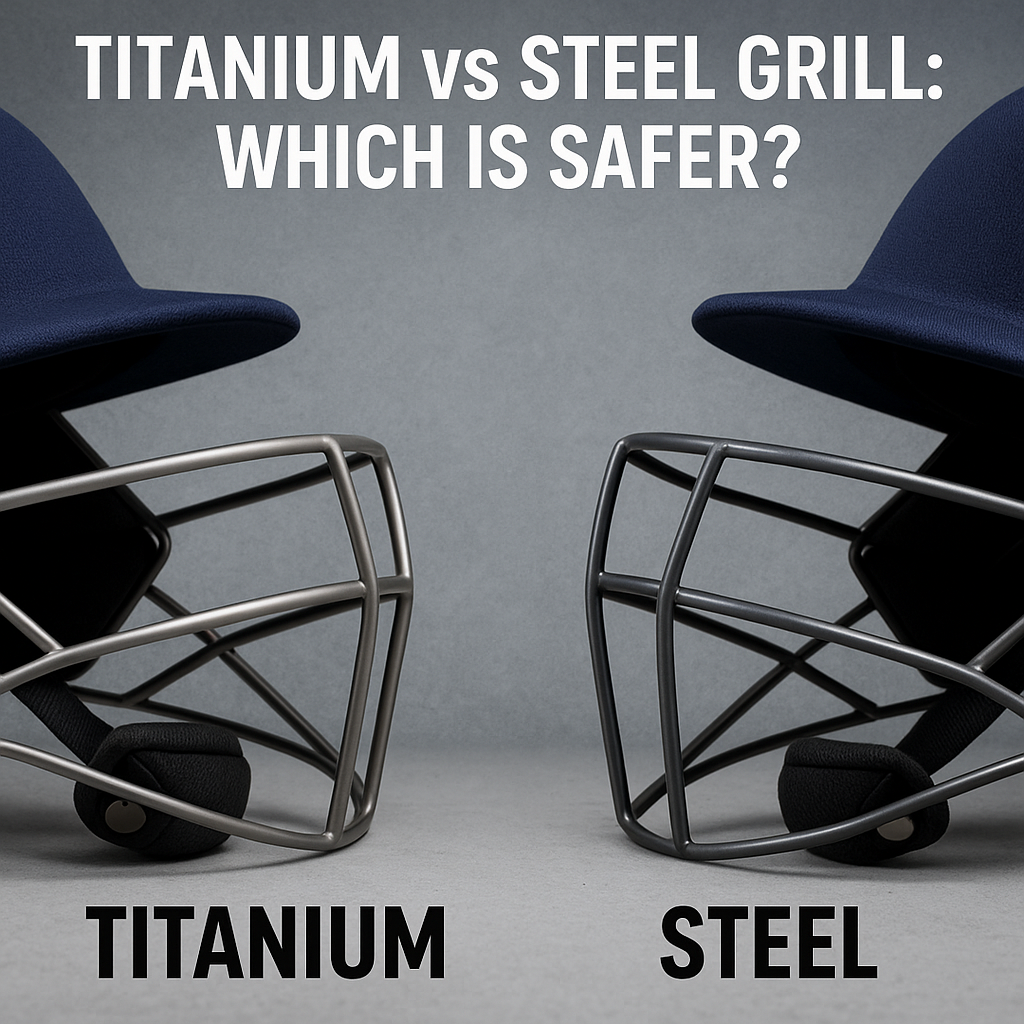When it comes to cricket helmets, one of the most debated questions among players—amateur and pro alike—is:
Should you go for a titanium grill or a steel grill?
Both materials are widely used in modern helmet design, but when safety is your top priority, understanding the difference matters. Let’s break it down so you can make the right choice for your game.
1. Strength and Impact Protection
Steel Grills:
Steel has long been the traditional choice in cricket helmet grills. It’s incredibly strong and does a great job absorbing the force of fast deliveries. A high-quality steel grill can withstand impact speeds up to 90+ mph, offering solid protection at an affordable price.
Titanium Grills:
Titanium is stronger than steel for its weight. That means it offers the same—if not better—impact protection while being significantly lighter. Many professional players prefer titanium because it reduces neck fatigue without compromising safety.
Verdict: Both offer strong protection, but titanium provides the same safety with less weight.
2. Weight and Comfort
Steel:
Steel grills are heavier. While the difference may seem small, over the course of long innings, it can affect comfort and head movement.
Titanium:
Titanium’s biggest advantage is its weight. It’s roughly 40% lighter than steel, making helmets feel less bulky and improving mobility at the crease.
Verdict: Titanium wins for comfort and endurance.
3. Price and Value
Steel:
Steel helmets are more budget-friendly. If you’re a club-level or beginner player, a steel grill offers reliable protection without stretching your wallet.
Titanium:
Titanium helmets come at a premium. However, many players see it as a long-term investment in safety and comfort—especially for those playing competitively or facing fast bowling regularly.
Verdict: Steel is great for affordability; titanium is ideal for premium performance.
4. Safety Standards and Real-World Use
Both titanium and steel helmets, when manufactured by reputable brands, meet international safety standards (like BS7928:2013). The material alone doesn’t define safety—design, fit, and build quality matter just as much.
Titanium helmets often provide better visibility because the thinner bars don’t obstruct vision as much, which can help players react quicker to fast deliveries.
Verdict: Both are safe if certified, but titanium often enhances vision and reaction time.
5. Durability
Steel:
Steel grills can rust or corrode over time, especially if not properly maintained.
Titanium:
Titanium is corrosion-resistant, meaning it stays in great shape for longer—even in humid or rainy conditions.
Verdict: Titanium lasts longer with minimal maintenance.
Final Thoughts: Which Is Safer?
In terms of pure safety, both materials perform exceptionally well when built to standard.
But if we’re talking about overall protection, comfort, and durability, titanium edges out steel. It’s lighter, stronger for its weight, and offers long-term reliability—making it a top choice for pro and semi-pro players in the USA.
However, for beginners or casual players, a high-quality steel grill helmet is still an excellent and safe option that won’t break the bank.
Bottom Line
-
Go with Titanium: If you value lightness, comfort, and long-term performance.
-
Choose Steel: If you want affordability with dependable safety for club-level cricket.
No matter which you pick, make sure your helmet is BS7928:2013 compliant and fits snugly—because safety always starts with the right fit.
Magnus Cricket USA — equipping every cricketer with the right gear for confidence, comfort, and protection.
#CricketUSA #HelmetSafety #TitaniumVsSteel #CricketProtection #MagnusCricket #PlaySafePlayStrong
